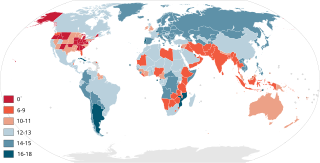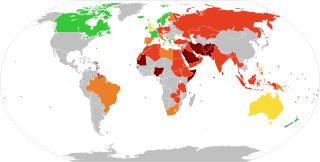Related Research Articles
A crime of passion, in popular usage, refers to a violent crime, especially homicide, in which the perpetrator commits the act against someone because of sudden strong impulse such as anger rather than as a premeditated crime. A high level of social and legal acceptance of crimes of passion has been historically associated with France from the 19th century to the 1970s, and until recently with Latin America.

The age of criminal responsibility is the age below which a child is deemed incapable of having committed a criminal offence. In legal terms, it is referred to as a defence/defense of infancy, which is a form of defense known as an excuse so that defendants falling within the definition of an "infant" are excluded from criminal liability for their actions, if at the relevant time, they had not reached an age of criminal responsibility. After reaching the initial age, there may be levels of responsibility dictated by age and the type of offense committed.
A criminal code is a document that compiles all, or a significant amount of a particular jurisdiction's criminal law. Typically a criminal code will contain offences that are recognised in the jurisdiction, penalties that might be imposed for these offences, and some general provisions.

A criminal record, police record, or colloquially RAP sheet is a record of a person's criminal history. The information included in a criminal record and the existence of a criminal record varies between countries and even between jurisdictions within a country. In most cases it lists all non-expunged criminal offences and may also include traffic offences such as speeding and drunk driving. In some countries the record is limited to actual convictions, while in others it also includes arrests, charges dismissed, charges pending and charges of which the individual has been acquitted.

Abortion laws vary widely among countries and territories, and have changed over time. Such laws range from abortion being freely available on request, to regulation or restrictions of various kinds, to outright prohibition in all circumstances. Many countries and territories that allow abortion have gestational limits for the procedure depending on the reason; with the majority being up to 12 weeks for abortion on request, up to 24 weeks for rape, incest, or socioeconomic reasons, and more for fetal impairment or risk to the woman's health or life. As of 2022, countries that legally allow abortion on request or for socioeconomic reasons comprise about 60% of the world's population.

Mahmoud Cherif Bassiouni was an emeritus professor of law at DePaul University, where he taught from 1964 to 2012. He served in numerous United Nations positions and served as the consultant to the US Department of State and Justice on many projects. He was a founding member of the International Human Rights Law Institute at DePaul University which was established in 1990. He served as president from 1990 to 1997 and then as president emeritus. Bassiouni is often referred to by the media as “the Godfather of International Criminal Law” and a “war crimes expert.” As such, he served on the Steering Committee for The Crimes Against Humanity Initiative, which was launched to study the need for a comprehensive convention on the prevention and punishment of crimes against humanity, and draft a proposed treaty. He spearheaded the drafting of the proposed convention, which as of 2014 is being debated at the International Law Commission.
The Republic of Iraq's legal system is in a period of transition in light of the U.S.-led invasion in 2003 that led to the fall of the Baath Party. Iraq does have a written constitution, as well as a civil, criminal and personal status law. In September 2008, the Iraqi Legal Database, a comprehensive database that makes all Iraqi positive law freely available to users online, was launched.
The ages of consent vary by jurisdiction across Europe. The ages of consent are between 14 and 18. The vast majority of countries set their ages in the range of 14 to 16; only three countries, Cyprus (17), Ireland (17), Turkey (18), do not fit into this pattern. The laws can also stipulate which specific activities are permitted or specify the age at which one or other sex can legally participate. The highlighted age is that from which a young person can lawfully engage in a non-commercial sexual act with an older person, regardless of their age difference, provided the older one is not in a position of power, a relative, or is committing another form of exploitation. In some jurisdictions, including Italy and Hungary, there are exemptions if the age difference is within prescribed bounds. All jurisdictions in Europe, except the Vatican City, have equal and gender-neutral age limits.
An honor killing, honour killing, or shame killing is the murder of an individual, either an outsider or a member of a family, by someone seeking to protect what they see as the dignity and honor of themselves or their family. Honor killings are often connected to religion, caste and other forms of hierarchical social stratification, or to sexuality. Most often, it involves the murder of a woman or girl by male family members, due to the perpetrators' belief that the victim has brought dishonor or shame upon the family name, reputation or prestige. Honor killings are believed to have originated from tribal customs. They are prevalent in various parts of the world, as well as in immigrant communities in countries which do not otherwise have societal norms that encourage honor killings. Honor killings are often associated with rural and tribal areas, but they occur in urban areas too.

Lesbian, gay, bisexual, and transgender (LGBT) persons in Benin face legal challenges not experienced by non-LGBT residents. Although same-sex sexual acts for both men and women are legal in Benin, homosexuals continue to face widespread persecution and are rarely open about their sexuality. They are also considered by many as deviants to the society, and homosexuality is often called a disease brought by the Whites to the country.
Prostitution in Romania is not itself criminalized, although associated activities, such as procuring, are criminal offenses, and solicitation is a contravention punishable by fines.

The Siracusa International Institute for Criminal Justice and Human Rights, until 2017 Istituto Superiore Internazionale di Scienze Criminali (ISISC) is a not-for-profit organisation located in Syracuse, Italy, that was established in 1972. The organisation specializes in the design and implementation of human rights, rule of law, justice and capacity building projects throughout the world. The organisation pays particular attention to such issues that arise from situations in Arab and Muslim countries.
Laws regarding incest vary considerably between jurisdictions, and depend on the type of sexual activity and the nature of the family relationship of the parties involved, as well as the age and sex of the parties. Besides legal prohibitions, at least some forms of incest are also socially taboo or frowned upon in most cultures around the world.

A sodomy law is a law that defines certain sexual acts as crimes. The precise sexual acts meant by the term sodomy are rarely spelled out in the law, but are typically understood by courts to include any sexual act deemed to be "unnatural" or "immoral". Sodomy typically includes anal sex, oral sex, and bestiality. In practice, sodomy laws have rarely been enforced against heterosexual couples, and have mostly been used to target homosexual couples.

A blasphemy law is a law prohibiting blasphemy, which is the act of insulting or showing contempt or lack of reverence to a deity, or sacred objects, or toward something considered sacred or inviolable. According to Pew Research Center, about a quarter of the world's countries and territories (26%) had anti-blasphemy laws or policies as of 2014.

Emil Stanisław Rappaport was the son of Feliks Rappaport and Justyna Bauerertz and a Polish Jewish lawyer. He was a specialist in criminal law and a founder of the doctrine of international criminal law. In 1930, he was awarded the Commander's Cross with Star of Order of Polonia Restituta.
Leila Nadya Sadat is the James Carr Professor of International Criminal Law at Washington University School of Law and the former Director of the Whitney R. Harris World Law Institute. She has served as Special Advisor on Crimes Against Humanity to Chief Prosecutor Fatou Bensouda of the International Criminal Court since December 12, 2012. Sadat is the Director of The Crimes Against Humanity Initiative, a multi-year project to study the problem of crimes against humanity and draft a comprehensive convention addressing their punishment and prevention. She has spearheaded the international effort to establish this new global convention. In 2012 Sadat was elected to membership in the U.S. Council on Foreign Relations, and in 2018 was elected as the President of the American Branch of the International Law Association for a two-year term in October 2018.

Nestor Courakis is Emeritus Professor of Criminology and Penology at the National and Kapodistrian University of Athens, Faculty of Law and a full-time Professor at the University of Nicosia.
The Paris Institute of Criminology is the oldest French research institute for criminal law and criminology. Founded in 1922 as a component of the Faculty of Law of Paris, it has since been transferred to Panthéon-Assas University. It is also part of the International Center for Sociological Penal and Penitentiary Research and Studies of Messina, Italy.
References
- ↑ "Archived copy" (PDF). Archived from the original (PDF) on 2007-06-10. Retrieved 2010-01-23.
{{cite web}}: CS1 maint: archived copy as title (link)